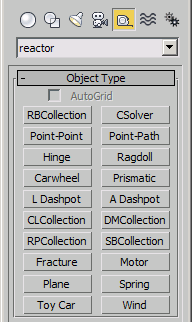L_Dashpot : Helper
 The Reactor dynamics system has been retired and REMOVED from 3ds Max 2012.
The Reactor dynamics system has been retired and REMOVED from 3ds Max 2012.
| Value > MAXWrapper > Node > Helper > reactor > L_Dashpot |
The Linear Dashpot Constraint allows you to constrain two rigid bodies together in the simulation, or to constrain one body to a position in world space. It behaves very similarly to a heavily damped spring. You can specify the dashpot’s strength and damping, and whether collisions between the attached bodies are disabled. You can specify a dashpot attachment point in each body's local space. During the simulation, the dashpot exerts impulses on the attached bodies in an attempt to make these points match up in world space, thus keeping the bodies in the same positions relative to each other. The bodies are still free to rotate around the attachment point.
When set to true , the Parent Body will be used in the simulation.
Get/Set the strength value which governs the size of the impulse the dashpot will apply to each attached body, taking into account the distance between the attachment points. The strength value is mass dependent.
Get/Set the samping value which affects how quickly the oscillation of the linear dashpot settles down. It governs the impulse applied to the connected bodies due to the relative velocities of their dashpot connection points
When set to true , collisions are disabled between the dashpot’s objects - during the simulation, they will be able to pass through each other. Defaults to false .
When set to true , the dashpot is not added to the simulation
When set to true , the relative transform between the child and parent constraint spaces is locked - if you move the child space in the viewport, the parent space will move with it, and vice versa.
Interfaces
When set to true , the Parent Body will be used in the simulation.
Get/Set the Parent Body's transformation matrix.
Get/Set the Child Body's transformation matrix.
When set to true , the relative transform between the child and parent constraint spaces is locked - if you move the child space in the viewport, the parent space will move with it, and vice versa.
Get/Set the strength value which governs the size of the impulse the dashpot will apply to each attached body, taking into account the distance between the attachment points. The strength value is mass dependent.
Get/Set the samping value which affects how quickly the oscillation of the linear dashpot settles down. It governs the impulse applied to the connected bodies due to the relative velocities of their dashpot connection points
When set to true , collisions are disabled between the dashpot’s objects - during the simulation, they will be able to pass through each other. Defaults to false .
When set to true , the dashpot is not added to the simulation
Aligns the Constraint to the Parent Body.
Aligns the Constraint to the Child Body.
Aligns the Constraint to parent space.
Aligns the Constraint to child space.
Aligns the Constraint to both bodies.
Returns true if the Constraint is valid, false otherwise. A valid Constraint has the correct number of rigid bodies attached and is included in a valid constraint solver.

